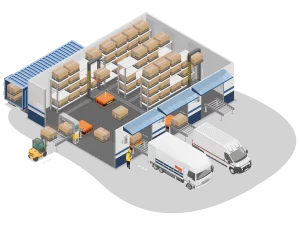
Milwaukee is a city located in the Midwest region of the United States. With a population of approximately 600,000 people, it is the largest city in the state of Wisconsin. Milwaukee is a major commercial and industrial center, and many companies operate distribution centers in the area. If you’re considering running a distribution center in Milwaukee, it’s important to consider the pros and cons.
Pros:
- Central location: Milwaukee is located in the heart of the Midwest, making it an ideal location for a distribution center. It is within a day’s drive of many major cities, including Chicago, Detroit, Minneapolis, and St. Louis. This makes it easy to transport goods to and from the distribution center.
- Access to transportation: Milwaukee has a well-developed transportation infrastructure, including an international airport, a major port on Lake Michigan, and several major highways that intersect in the city. This makes it easy to transport goods by air, sea, or land.
- Skilled workforce: Milwaukee has a skilled and diverse workforce, with many workers experienced in logistics, transportation, and distribution. The city also has several universities and technical colleges that offer programs in logistics and supply chain management.
- Low cost of living: Compared to other major cities in the United States, Milwaukee has a relatively low cost of living. This means that you can offer competitive wages and benefits to your employees while still keeping your operating costs low.
Cons:
- Harsh winters: Milwaukee is located in a region that experiences harsh winters, with cold temperatures and heavy snowfall. This can make it difficult to transport goods during the winter months, and can also increase heating costs for the distribution center.
- Labor unions: Milwaukee has a strong labor union presence, which can make it difficult to negotiate wages and working conditions with your employees. Unionized workers may also be more resistant to changes in the workplace, which can make it difficult to implement new technologies or procedures.
- High taxes: Wisconsin has a relatively high corporate tax rate, which can increase the operating costs of your distribution center. In addition, Milwaukee has a local sales tax, which can add to the cost of goods sold.
- Competition: Milwaukee is home to several large distribution centers operated by major companies, including Amazon, Target, and Walmart. This can make it difficult to compete in the local market, especially if you are a smaller or newer company.
Running a distribution center in Milwaukee has both advantages and disadvantages. The city’s central location, transportation infrastructure, and skilled workforce make it an attractive location for many businesses. However, the harsh winters, strong labor unions, high taxes, and competition from larger companies can make it challenging to operate a successful distribution center in the area. Careful consideration of these factors is important when deciding whether Milwaukee is the right location for your business.
Milwaukee’s central location in the Midwest region of the United States makes it well-suited to serve cities across the region, such as Chicago, Detroit, Minneapolis, St. Louis, and Indianapolis. These cities are all within a day’s drive from Milwaukee, and they represent major population centers with a high demand for goods and services.
In addition, cities with a strong manufacturing or industrial base may also be good markets for a distribution center in Milwaukee. For example, nearby cities such as Green Bay, Racine, and Kenosha are known for their manufacturing and industrial sectors, and they may have a high demand for raw materials, equipment, and finished goods.
It’s important to consider the logistics and transportation infrastructure in each city when selecting delivery destinations. Factors such as the availability of highways, railways, airports, and ports can all impact the efficiency and cost-effectiveness of delivering goods from a distribution center in Milwaukee.

